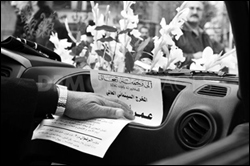 Influential Syrian film director and thinker Omar Amiralay passed away at the age of 65 on Saturday, February 5, 2011. Amiralay's legacy of important documentaries has always been banned in his homeland, Syria. A few days before his death, Amiralay signed a declaration by independent Syrian intellectuals in support of the anti-government street protests in Egypt. Syrian writer and poetess Hala Mohamed said that it was a stroke that claimed Amiralay's life, pointing out that he had not complained of any health problems prior to his death. She added that his death was a great loss and tragedy for the Arab World and not just for Syria, who lost a talented innovator and an acclaimed thinker who greatly contributed to the Syrian Cultural milieu, and established his own brave intellectual and political stance. Film director Nabeel Al Maleh said: Omar's departure has come as a shock and as an insurmountable loss for different generations. He was an international innovator and professional. His worries about the nation must have contributed to his death, for he was fierce and unyielding in his resistance of official positions that harm the people."
Influential Syrian film director and thinker Omar Amiralay passed away at the age of 65 on Saturday, February 5, 2011. Amiralay's legacy of important documentaries has always been banned in his homeland, Syria. A few days before his death, Amiralay signed a declaration by independent Syrian intellectuals in support of the anti-government street protests in Egypt. Syrian writer and poetess Hala Mohamed said that it was a stroke that claimed Amiralay's life, pointing out that he had not complained of any health problems prior to his death. She added that his death was a great loss and tragedy for the Arab World and not just for Syria, who lost a talented innovator and an acclaimed thinker who greatly contributed to the Syrian Cultural milieu, and established his own brave intellectual and political stance. Film director Nabeel Al Maleh said: Omar's departure has come as a shock and as an insurmountable loss for different generations. He was an international innovator and professional. His worries about the nation must have contributed to his death, for he was fierce and unyielding in his resistance of official positions that harm the people."
Syrian film director Omar Amiralay was born in Damascus in 1944. His documentaries stand out for their political criticism. From 1966- 1967, he studied Theatre at L'Université du Théâtre des Nations in Paris. He also joined the Higher Institute of Cinema Studies in Paris, but dropped out after the student strikes of 1968. His documentaries include: Film Essay on the Euphrates Dam (1970), A Scent of Paradise (1982), Love Aborted (1983), A Plate of Sardines (1997), and A Flood in Baath Country (2003).
www.alowaisnet.org
Syrian film maker Omar Amiralay, whose documentaries exposed the social and economic life in Syria since the Baath Party took power five decades ago, died on Saturday. He was 66.
Amiralay, one of the Arab world's most influential film makers who achieved international renown with works such as A Flood In Baath Country, had a heart attack at home in Damascus, friends said.
A week before his death, he signed a declaration by independent Syrian figures in support of the anti-government street protests in Egypt.
"Amiralay died at the moment when he was needed most as a voice for liberty in Syria," one friend said.
Most of Amiralay's films are banned in Syria, where the state has a monopoly on cinema production. Born in Damascus of Circassian, Turkish and Arab origin, he studied in Paris.
He helped make Cousin, about leading Syrian opposition figure Riad al-Turk, who spent more than 17 years as a political prisoner in solitary confinement during the rule of late president Hafez al-Assad.
"I live in a country steadfastly marching on its hooves to its own demise, after it was betrayed by its rulers, deserted by its brainpower and abandoned by its intellectuals," Amiralay said before his death.
"My cinema is no more than my expression of scorn at the despair and tyranny that governs life around me, and the role of man in compounding it with more hopelessness and abuse."
A tall, soft spoken man with a dry sense of humour, Amiralay dismissed Syrian government controls over culture, which he said smothered innovation and resulted in the disappearance of cinema going as a national pastime.
Reuters